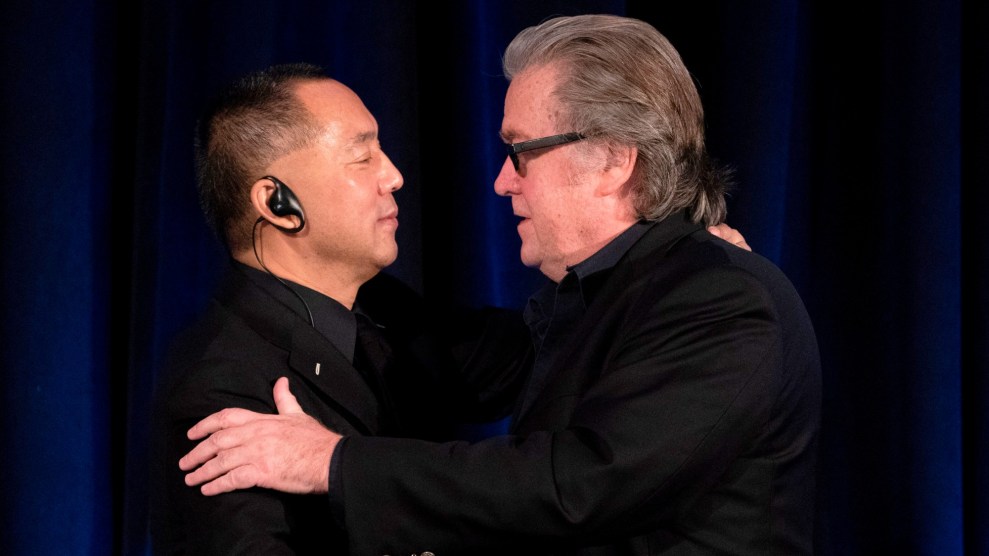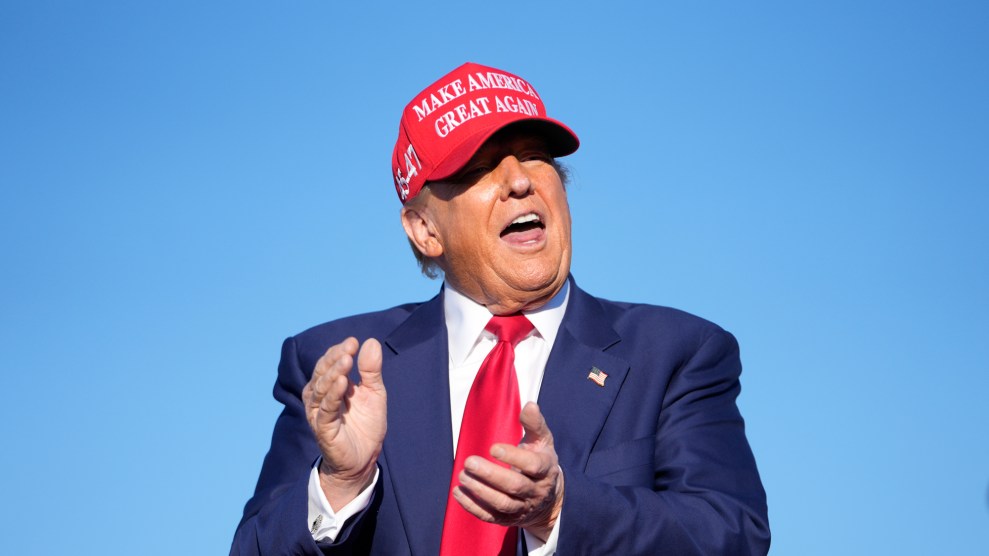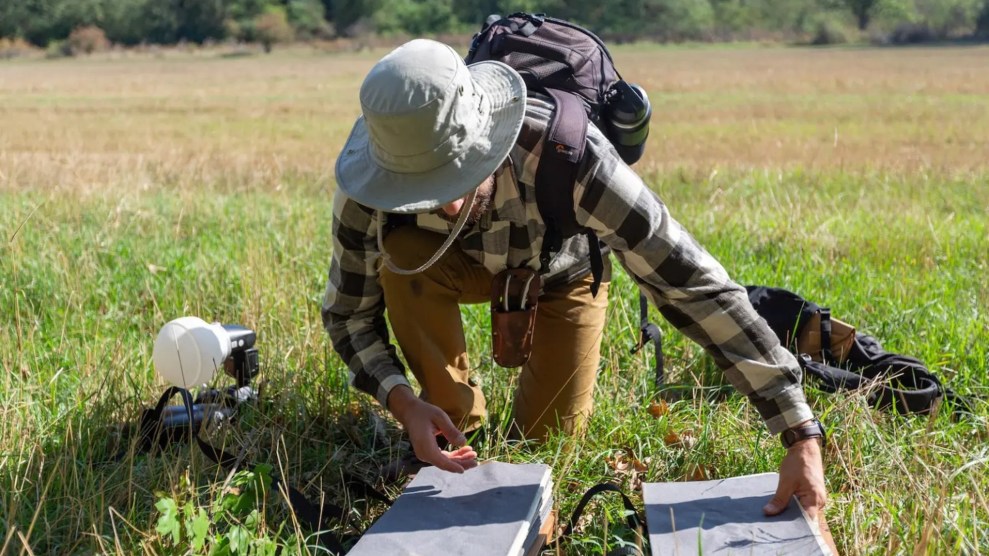
The House Select Committee to Investigate the January 6th Attack meeting on December 1, 2021, to consider a criminal contempt charge for a prospective witness. Tom Williams/AP
Editor’s note: This column by David Corn first appeared in his newsletter, Our Land. But we wanted to make sure as many readers as possible have a chance to see it. Our Land is written by David twice a week and provides behind-the-scenes stories about politics and media; his unvarnished take on the events of the day; film, book, television, podcast, and music recommendations; interactive audience features; and more. Subscribing costs just $5 a month—but you can sign up for a free 30-day trial of Our Land here. Please check it out.
The House select committee investigating the January 6 attack is boldly going where congressional committees almost never go: prime time. Next month, the panel is set to hold a week or so of hearings, and to achieve maximum impact, it intends to put on its show in the evening, starting in the 8:00 hour on the East Coast, when there is potential for a large television audience. With this move, the committee could achieve what hasn’t occurred in a long time: a congressional hearing that makes a difference.
Blockbuster congressional hearings used to be a fixture in American life. The Army-McCarthy hearings. The Senate Vietnam War hearings (during which a young antiwar vet named John Kerry poignantly remarked, “How do ask a man to be the last man to die for a mistake?”). The Watergate hearings. Iran-contra. Clarence Thomas-Anita Hill. These and other hearings riveted the nation. (The Thomas-Hill hearings included a dramatic evening session.) Occasionally hearings have made news that has defined issues or yielded significant change. The 1994 hearing that placed in the hot seat the chief executives of the top seven tobacco companies—who each testified that they did not believe cigarettes were addictive—was a landmark moment in the battle against Big Tobacco and corporate malfeasance. Hillary Clinton’s marathon 11-hour appearance before a House Benghazi committee demonstrated that the Republicans’ conspiratorial allegations were baseless.
Yet congressional hearings have generally not had the impact they once did. Overall, the quality of these sessions has decreased. There’s usually too much jawboning by senators and representatives who are ill-prepared and interested mostly in producing a soundbite that may or may not be relevant to the subject of the hearing. The sessions can produce viral clips that bring attention to an important subject. (Democratic Representatives Alexandria Ocasio-Cortez and Katie Porter have demonstrated talent in this regard.) And they can still offer drama, as with the Brett Kavanaugh-Christine Blasey Ford showdown. But often they don’t do much to alter narratives or the world.
House Republicans turned the hearings for the first Donald Trump impeachment into a mess, with their constant braying about Deep State plots and conspiracy theories. It was Russian disinformation and other rigamarole designed to distract from Trump’s wrongdoing. And remember the hearing with special counsel Robert Mueller after the release of his report on the Trump-Russia investigation? He was tentative and taciturn and did little to advance the story of Vladimir Putin’s attack on the 2016 election and the Trump crew’s interactions with Moscow operatives. It’s been a while since there was a gangbuster hearing that captured the attention of the public for the right reasons.
The January 6 committee is trying to do better. Its members and staff have been thinking about how to stage a hearing that matters. They want to captivate the country and convey the full significance of the insurrectionist assault on Congress that prevented the peaceful transfer of power and that nearly caused a breakdown in the nation’s constitutional order. To that end, they intend to ensure that each nightly installment contains new revelations, information that can generate headlines and command widespread interest—especially in the face of what will be an all-out campaign waged by Trump and his allies to downplay and denigrate the hearings.
They also aim to construct compelling and coherent narratives about the different aspects of their multifaceted investigation. The plan is not to only focus on the day of the assault but to show the public the full picture of Trump’s efforts to subvert the election. There’s a lot to probe here: Trump pressuring state officials to improperly overturn election results; fake electors; links between the Trump White House and right-wing agitators; Trump’s attempt to lean on Justice Department officials; the involvement of congressional Republicans in schemes to undermine the vote count; the participation of far-right militias; and more.
One committee member, Rep. Jamie Raskin (D-Md.), has displayed the ability to convey a strong narrative in such a setting. He was the lead House impeachment manager for the second Trump impeachment trial. As he notes in his memoir, Unthinkable: Trauma, Truth, and the Trials of American Democracy, when he pulled together the team of House managers for that proceeding, he told them,
We are not going to get up and make a series of disconnected speeches of great oratory that vanish into thin air. We are going to tell America and the Senate one single, unforgettable story with short, vivid chapters brought to life by you and by video, one spellbinding and appalling narrative about how Donald Trump became obsessed with denying the reality of his defeat and Joe Biden’s victory and then set about using every means in the world, first lawful and nonviolent, then unlawful and criminal, and then, finally, violent and criminal, to overthrow the lawful presidential result and replace it what he called his “continuation in office.”
And Raskin achieved that. The case he and his team presented in the Senate was well-crafted and engaging, featuring gripping and upsetting video that had not been previously seen. They managed to win 57 votes for conviction, including seven Republicans, racking up the first bipartisan conviction majority in an impeachment trial—though it fell ten votes shy of the two-thirds vote required for conviction. Raskin showed that legislators could apply a sense of showmanship and news to a well-constructed presentation. The January 6 committee will not be seeking to win a legal argument, though at the end of its deliberations it could well recommend prosecutions. Its main task is to inform the public, create a historical record, and to highlight the threat to democracy that has not yet been eradicated. But the committee has a better chance of accomplishing this mission, if it can present forceful storytelling with a dash of pizzazz.
With all hearings, a key component is witnesses. John Dean, the Nixon White House insider who spilled the beans, became the star of the Watergate hearings. The committee has yet to release a list, and we do know that a great many of the key participants have not been cooperating with the panel. The public deserves to hear the testimony of former White House chief of staff Mark Meadows, former Vice President Mike Pence, Trump attorney John Eastman, crazy-man lawyer Rudy Giuliani, Ivanka Trump, and others, including the former guy himself. But crucial players are resisting, and the Justice Department has not been rapidly pursuing cases against those cited for contempt. On Thursday, the committee took the unprecedented step of subpoenaing five House Republicans: Kevin McCarthy, Jim Jordan, Scott Perry, Mo Brooks, and Andy Biggs. Each had been asked to provide voluntary testimony about their involvement in Trump’s Big Lie schemes and had told the committee to get lost. It’s unclear what will happen when they resist the subpoenas, but they won’t be testifying at the hearings.
Committee members and staffers have been saying that they have been surprised by the amount of material their investigation has gathered, including documents and testimony. That suggests there could be surprises at the hearings in terms of witnesses and revelations. Will there be witnesses who saw Trump’s actions on January 6? That could be must-see television.
In all societies, the fight to document history is a crucial endeavor. This is especially so in the face of creeping authoritarianism. Autocrats strive to control the narratives of the past and present to gain and preserve power. Trump and his gang want to diminish the January 6 assault and his attacks on constitutional government to remove the stench that hangs on the GOP and to clear the path for a possible Trump restoration. If they could, they would airbrush all this out of the picture. GOP leaders refused to support the establishment of a bipartisan commission to investigate January 6, which led House Speaker Nancy Pelosi to wisely set up a committee that would not include obstructionist Republicans eager to turn its proceedings into a shitshow. (The two Republicans on the committee are Liz Cheney and Adam Kinzinger, who have broken with the Trump cult.)
The committee’s job is to provide the public a full accounting of Trump’s attempted coup and the resulting raid on the Capitol. The early signs are that it could well present a powerful and troubling story. After that, it will be up to the American public to decide what to do with this tale.
















